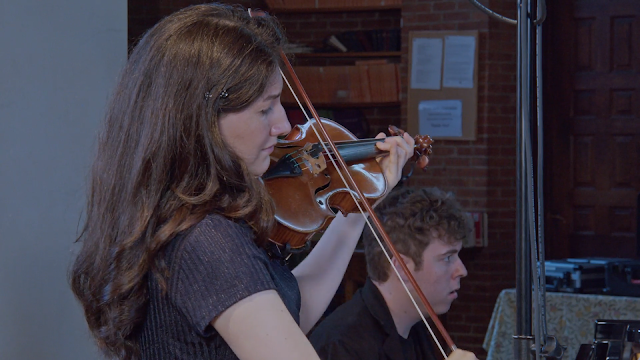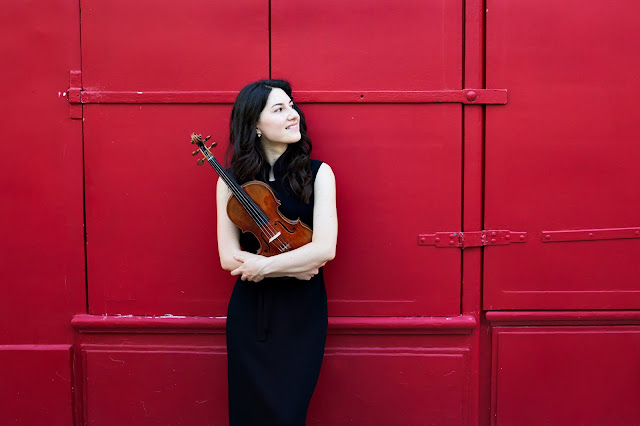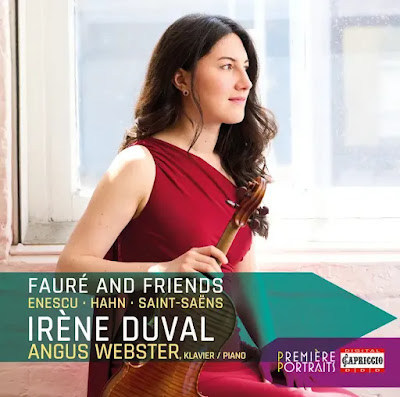 |
| Irène Duval recording Fauré and Friends with Angus Webster |
Violinist Irène Duval has been spending quite a bit of time with Fauré recently, 2024 being the centenary of his death. Her disc Fauré and Friends with pianist Angus Webster was released on Capriccio in September, and the disc puts Fauré’s music for violin and piano alongside that of his friends and contemporaries, Reynaldo Hahn, Georges Enescu and Camille Saint-Saëns. In November she will join violinist Joshua Bell, cellist Steven Isserlis, and pianist Jeremy Denk for Wigmore Hall’s Gabriel Fauré Centenary Celebrations.
Irène explains that she has played Fauré’s chamber music a lot and has come to love it, finding so much hope and light in the music. She feels that it is music that takes you to an ideal world. Having played the music so much and developed a deep understanding of it, she was in the right place to present the music on disc for the centenary.
 |
| Irène Duval (Photo: Kaupo Kikkas) |
Having already recorded Fauré’s Violin Sonata No. 1 on her disc, Poèmes, the new disc included all of the composer’s remaining music for violin and piano. The disc includes Fauré’s Violin Sonata No. 2 which is a late work and is far less known than the composer’s first sonata. It was a piece that the more Irène got to know it, the more she came to love it. She describes this process as akin to tasting a new disc, coming to understand its subtleties and then loving it for its particularity. Whilst she loves Fauré’s first sonata, she has come to prefer the second, finding something deeper in it, particularly in the second movement. She enjoyed the challenge of making so complex a piece understandable for the audience. She worked on the programme for two years before the recording took place, a process that was long but which she describes as amazing.Alongside the music of Fauré, there are pieces by his friends, with each of Fauré’s pieces paired with one by another composer so that there are two Berceuses (Fauré and Saint-Saens), two Romances (Fauré and Hahn) and two Sonatas (Fauré and Enescu). She wanted to give the audience a different type of listening experience so that they could compare and contrast.
The Violin Sonata No. 2 by Georges Enescu is the least known piece on the disc, but Enescu studied with Fauré when he first came to Paris, working on the sonata from the ages of 14 to 17, whilst he was still studying with Fauré. Whilst Enescu is an undoubted genius, Irène also likes the idea of having music by someone you do not quite expect. She likes this with programmes, including unexpected pieces or music by lesser-known composers.
Wigmore Hall’s Gabriel Fauré Centenary Celebrations include five concerts of chamber music by Fauré and contemporaries from 1 to 5 November, and Irène will be playing sonatas by Fauré (with Jeremy Denk) and Enescu (with Connie Shih), plus Fauré’s Piano Quintet with an ensemble including Joshua Bell. The concerts are linked to a project to record the complete Fauré chamber music being masterminded by Steven Isserlis. Irène comments that it is an amazing celebration and exciting to have a concert on the exact centenary (4 November).
Looking ahead she has a new obsession, Martinu’s third sonata. She played it in Perth for a BBC recording and now wants to play it more, finding it an exciting piece. Also, she wants to perform more music by female composers, a project she started during COVID. She finds it exciting to be able to dig into new obsessions and move away from French music. Another discovery is Russian music, notably Sergei Taneyev whose second string quintet she describes as amazing.
Her next recording, planned for 2026 is called Lost Violin Concertos and features three works, each of which were lost for a period. Schumann’s Violin Concerto is perhaps the most famous work on the disc. Fauré started writing his Violin Concerto after the first violin sonata and he only completed one movement. He used a theme from the concerto in his very last work, his string quintet. Unlike a lot of Fauré’s music, the writing for the violin is virtuosic and Irène describes it as fun. The third work on the disc is Reynaldo Hahn’s violin concerto. This was played three times and then lost, the score finally turning up in a library in Argentina. It is a substantial piece, lasting around 30 minutes but Irène describes it as fun. She will be recording the disc with a Spanish orchestra, and Angus Webster, her pianist from Fauré and Friends, will be conducting, so there is a link back to the previous disc.
Another recent disc that she participated in is Music of the Angels, on Hyperion, where she joined Steven Isserlis and the Orchestra of the Age of Enlightenment for a disc of cello concertos, sonatas and quintets by Luigi Boccherini, music she describes as charming.
At the age of seven, she was in a choir at school, but though she loved singing, she hated learning the text. But she saw an orchestra and had an instant crush on the violin. She loved its size, but also the way you can sculpt with sound using the instrument. She found incredible magic in being able to create sound from a few horse-hairs. It was instant love and seven-year-old Irène was intrigued. She had always been fascinated by fencing, and the violin bow also reminded her of fencing.
Come 2018, her father was battling cancer and was not getting better. She felt that she could not play pieces that were too dark and intense, and this is the main reason why she chose Fauré. In the circumstances she found his music uplifting, she needed it. Her father passed away a few months before the recording, and the recording itself became very therapeutic.
The blog is free, but I’d be delighted if you were to show your appreciation by buying me a coffee.
Elsewhere on this blog
- The Heart of the Matter: rare Britten and new James MacMillan in an imaginative programme for tenor, horn and piano – concert review
- The Turn of the Screw: Charlotte Corderoy’s notable conducting debut at ENO with Ailish Tynan’s compelling performance – opera review
- An engaging evening of fun: demonstrating the very real virtues of Gilbert & Sullivan at its best, Ruddigore at Opera North – opera review
- Beyond the idea of just four guys & their trombones: Slide-Action on their mission to create a new voice for the trombone – interview
- Character, charm & 60s vibe: Britten’s A Midsummer Night’s Dream at Opera North – opera review
- Attention to detail & sheer energy: Haydndyah from Lars Ulrik Mortensen & Concerto Copenhagen on Berlin Classics – record review
- Over-arching themes and influences: Andrew Ford’s The Shortest History of Music – book review
- Inventive and imaginative: Olivia Fuchs’ successfully reinvents Rimsky Korsakov’s The Snowmaiden for English Touring Opera – opera review
- Portraits of a troubled family: Bernstein’s Trouble in Tahiti & A Quiet Place at the Royal Opera House – opera review
- Leading with a love that inspires: Tafelmusik has a new collaboration with violinist Rachel Podger & a new disc of Haydn symphonies – interview
- Home







%20Craig%20Fuller.jpg?w=160&resize=160,160&ssl=1)
